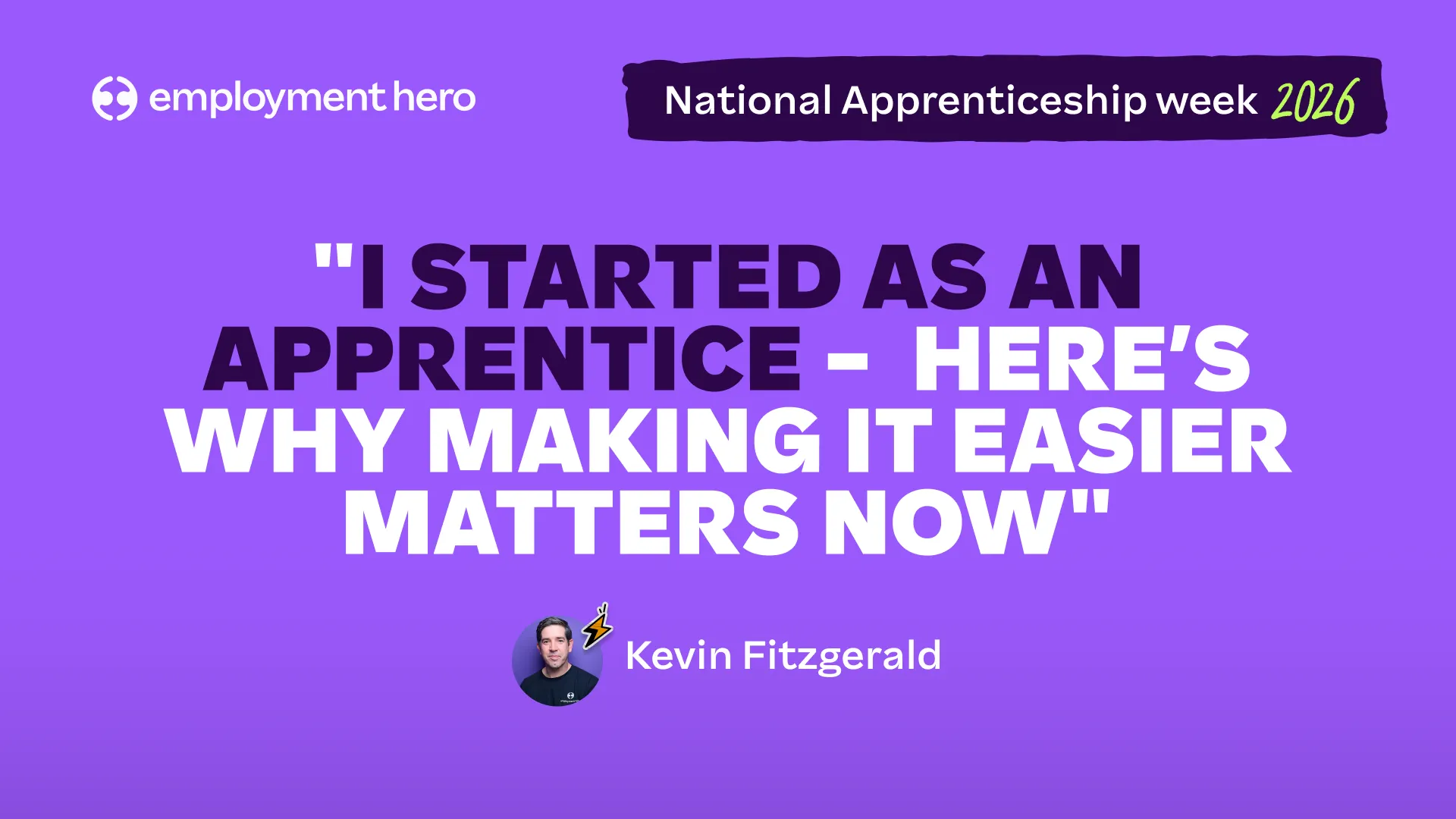What is an Employee Value Proposition (EVP)?
This HR buzzword is critical for your business, so we’ve written this to give you the low-down on employee value proposition and what it means for your business.

In today’s competitive job market, attracting and retaining top talent is more challenging than ever. But how can organisations stand out and appeal to the best candidates?
Enter the concept of the Employee Value Proposition (EVP)—a powerful tool that shapes not only how employees perceive their company but also how potential candidates view your brand. But what is an EVP?
A well-thought-out EVP can make your company more attractive, improve employee engagement, and significantly reduce turnover. It describes what you can offer employees in exchange for their hard work, time and loyalty.
Let’s explore what makes up an effective EVP, why it’s crucial for both recruitment and retention and how you can develop one that resonates with your workforce.
What is an EVP?
EVP stands for Employee Value Proposition, and is defined as a statement of the values, rewards, recognition, support and company culture that an employer gives employees, which enables them to achieve their highest potential.
But lets cut the jargon, in simple terms, EVP refers to the benefits and perks offered to employees. Yes, this includes financial perks but it also covers flexible working, an inclusive work environment and opportunities for recognition.
The goal? To attract and retain top talent and improve employee happiness.
Employee value proposition examples
There are a variety of things employers can do in regards to an employee proposition, and it can be unique to your business and culture.
Some good examples include:
- Competitive salaries
- Bonuses
- Benefits/ perks
- Continuous professional development
- Career progression
- Strong work/ life balance
- Team building events/ team socials
The Importance of an EVP
So we’ve established what is an EVP, but why is it important for your business?
Attracting top talent
For any business to thrive, it needs to have skilled, enthusiastic and driven employees. But finding, and retaining top talent isn’t always easy. Having a solid EVP puts your business in a strong position to attract, hire and retain the right people.
Attracting and hiring employees who have goals and values that align with your business and company culture is a game changer, and an employee proposition can help to achieve this.
When done well, a compelling EVP offers a comprehensive look into each job role, making sure the role is attractive to candidates and showing them more about the company culture to ensure they will be a good fit from the offset.
Improves company reputation
Company reputation is important; for potential employees, customers and clients alike. The reality is, that companies may miss out on business opportunities if clients or customers hear negative things.
A strong employee value proposition will help to elevate and strengthen your brand. Not only does this make your business a more desirable place to work, but it also entices customers and clients.
Happy employees and more business opportunities… What’s not to like?
Retaining existing employees
As Hubspot reports, a whopping 86% of workers would not want to work for a company that has a bad reputation with former employees. By contrast, 75% of active job seekers are likely to apply for a job if the employer actively manages their company’s EVP.
With such a large percentage of job seekers actively looking for positive employer branding, this is definitely something to pay attention to.
According to Gartner, companies with a strong EVP reduce annual employee turnover by over two-thirds (69%).
If you’re having trouble recruiting talent, maybe it’s time to do things differently. That could very well include overhauling your Employee Value Proposition.
Boosting employee engagement
When employees have a clear vision of their company’s mission and values, they are more invested, leading to a more engaged workforce. If an employee feels connected to the overall company vision, they are more likely to go above and beyond.
In fact, Gartner found that companies with an elevated EVP increased new hire commitments by 29%. Just another reason to make yours stand out.
Key Components of an Effective EVP
It’s clear that having an Employee Value Proposition in place is beneficial for any business. And we recommend you continuously rework, redefine and articulate your EVP to new and existing employees.
But knowing how to create an effective EVP is easier said than done. So to help you out, here are our top tips.
Clearly define your employee personas
Employee personas can help you understand what your people appreciate and the type of employee experience you should be creating for them.
This is the first step in truly understanding the various personalities, skills, experiences, knowledge, behaviours and attitudes that drive productivity and performance.
In today’s increasingly diverse workforce, businesses rely on a variety of employee backgrounds and perspectives to better understand customer needs and drive innovation. And just like you would a customer, starting by empathising with each employee’s target segment (or in other words, what makes them tick) is key to the EVP development process.
Listen to what your existing employees have to say
Once you have identified and examined the diverse needs within your company, start to engage with them by gaining an understanding of what motivates them at work.
You want to hear what employees seek in their workplace and what makes them feel happy, engaged and motivated to perform. These answers can be found in your past, current and prospective employees.
Some key ways you can gather this data from your team include:
- Exit interviews to understand why it is that past employees have chosen to leave your company and what you could do differently in the future.
- Focus groups, 1:1 meetings and surveys for current employees to see what they enjoy about the existing employee experience and ideas for how it can be improved.
- Interviews with prospective candidates can also provide a unique insight into what makes your company culture attractive and why that’s important.
The key components are:
Compensation
Salary and competitive compensation will factor highly when putting together an EVP. However, while it may be the first element that comes to mind when thinking about what attracts employees to a role, compensation isn’t the sole deciding factor.
When putting together an EVP, you should include a compensation package that includes an array of benefits including bonuses, paid time off, retirement plans, housing allowance and more.
Benefits
Benefits are an integral part of your EVP and can include anything that promotes work/life balance and employee wellbeing. Benefits show your commitment to employee welfare and come in the form of health insurance, gym memberships and company cars.
Work/Life Balance
Flexible working hours, remote work options and support for personal commitments all help to boost employee morale and reduce burnout.
Company Culture
A strong EVP should include both short-term and long-term elements and that’s where a positive company culture comes in. Your company should be a place where employees enjoy working and feel valued, respected and secure. Your company culture is a central aspect of your EVP.
Recognition and Rewards
Formal and informal rewards are a great way to celebrate employee achievements and contributions.
Working Environment
Team dynamics and the design and condition of the workplace are both key components of an EVP.
Developing your EVP
We’ve spoken about EVP meaning, and the benefits, but how do you begin to develop one for your workplace? Don’t worry, we’ve got you covered.
Before diving into rolling out your EVP, it’s essential that it is clearly defined. This makes it easy to communicate it to employees and candidates.
Start to get your EVP down on paper, even if it has already been defined by your company in the past. Work closely with your marketing team as well to ensure your EVP ties nicely in with your company’s mission and overall brand.
Conducting Employee Surveys and Interviews
Your EVP is basically like holding up a mirror and having your employee experience reflected back at you so it makes sense that your employee’s feelings and feedback are at the very heart of it.
Create surveys and conduct interviews to gain valuable insights into employee satisfaction, experience and expectations and shape your EVP around this. Ask your employees why they like working for your company, if they would recommend the company to a friend and what factors would make them feel more supported in their role.
Doing this will give you hints on how your employees perceive your company’s values and will highlight any misalignments between the perks that employees value and what you offer.
Analyse competitor EVPs
You can learn a lot by analysing your biggest competitor’s EVPs. Knowing what draws top talent to competitor companies can inform your recruitment process and inspire you to create a more appealing workplace culture. This is how you can learn best practices and identify areas of improvement.
Define your unique strengths
Document exactly what it is that you can offer employees and use these to stand out from the crowd. Make sure it aligns with your brand messaging and company values.
Create a clear and concise EVP statement
Who are your target employees? What do they value most in the workplace? Once you have an idea of this, write down some of the unique things you can offer them. Avoid jargon here, be clear, and concise and aim for no more than three sentences that encapsulate what employees can gain from joining your company.
Don’t forget to include how employees can make a difference which can be a key motivator. There you have it! Your first draft is complete.
Rework, refine and finalise it.
Communicate and implement your EVP
Once it’s reworked and defined, make sure you communicate your new employee value proposition with the entire company. Even current employees should be reminded about why it’s so awesome to work at your company!
Review and iterate
Your EVP should always be growing and evolving just as your company does. Review it regularly to ensure it stays relevant and effective in attracting and retaining top talent.
Elevate your EVP with Employment Hero
Implementing an Employee Value Proposition will have a positive impact on your business, and although it seems daunting to start with, we are here to help.
Employment Hero’s Employment Operating System is designed to streamline HR and payroll processes, meaning managing your EVP has never been easier..
But with Employment Hero you can do so much more than just manage your EVP. Our all-in-one HR, hiring, and payroll solution is built to flex with your business. Offering everything you need, from finding and hiring top talent to onboarding new hires, automating complex payroll and driving employee engagement, all backed by UK-based support. Spend less time on admin, and more time on what matters – your people.
To learn more about how Employment Hero can benefit your business, talk to one of our specialists today and request a demo.
Related Resources
-
 Read more: 7 Ways Employment Hero Can Help You Retain Top Talent
Read more: 7 Ways Employment Hero Can Help You Retain Top Talent7 Ways Employment Hero Can Help You Retain Top Talent
Contents Retaining top talent in 2026 is about more than providing a positive workplace culture; employees are looking for jobs…
-
 Read more: Bradford Factor Alternatives: Practical Ways to Manage Absence in 2026
Read more: Bradford Factor Alternatives: Practical Ways to Manage Absence in 2026Bradford Factor Alternatives: Practical Ways to Manage Absence in 2026
Discover smarter absence management strategies for 2026. Explore Bradford Factor alternatives that focus on employee wellbeing and building a resilient…
-
 Read more: Government red tape risks blocking youth jobs as SMEs look to access apprenticeship scheme
Read more: Government red tape risks blocking youth jobs as SMEs look to access apprenticeship schemeGovernment red tape risks blocking youth jobs as SMEs look to access apprenticeship scheme
February 9, 2026: New Employment Hero research finds 73% of SME leaders intend to leverage new Government apprenticeship schemes following…





















